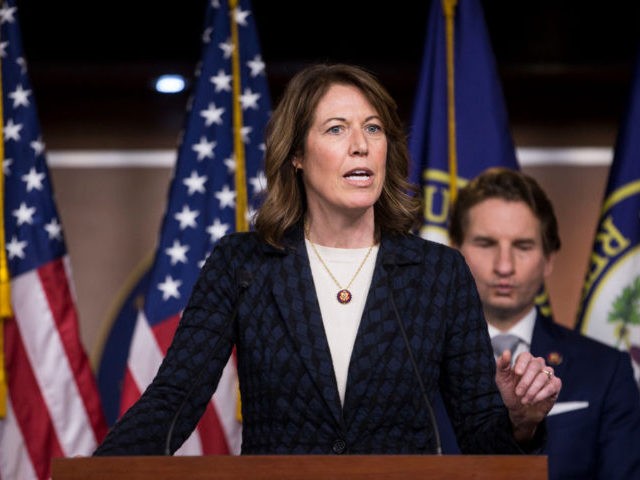Iowa’s only remaining congressional Democrat, Rep. Cindy Axne, reportedly took campaign contributions from corporate executives, donors in the financial world, and PACs after pledging not to.
Last campaign cycle, over 150 Democrat congressional candidates, including Axne, took a pledge not to accept any corporate PAC money. However, the Daily Beast now reports that Axne broke her promise and even deleted the pledge off of her campaign website.
Axne, a second-term lawmaker who sits on the House Financial Services Committee and the Agriculture panel, found ways to accept the money as campaign contributions. The report noted, she has “received tens of thousands of dollars from corporate executives—and hundreds of thousands of dollars from donors in the financial world.” Axne took money from executives at corporations that have their own PACs like ITC Holdings and Wells Fargo.
The Democrat, while sitting on the Financial Services Committee, also took numerous amounts of money from executives in the industry. “She’s taken money from lobbyists, like Michael Williams, the founder of the Williams Group, a D.C. firm which registered to lobby Congress on behalf of seven major financial firms two weeks after Williams’ donation,” the report said.
The U.S. Chamber of Commerce gave the congresswoman $1,000 just weeks after the group honored her with their “Spirit of Enterprise Award.” The Chamber is the largest lobbying organization in the country. According to the online web archives the news organization uncovered, Axne deleted the pledge from her “issues” section of her campaign-funded website between last 2019 and early 2020, with no other major edits to the page.
The report continued:
Axne, of course, is far from unique. She joined a wave of Democratic candidates in 2018 in rejecting corporate PAC contributions. And with the exception of a $2,500 gift from Land O’Lakes PAC in early 2019, she kept her word. When she received a $1,500 donation last year from the PAC belonging to Rock Holdings—the parent company of Quicken Loans—she returned it the same day.
…
Corporate PACs comprise a comparatively small amount of overall campaign donations. They can’t give a candidate more than $5,000 per election. And while they pool money from voluntary employee contributions, many PACs draw a large share of that funding—sometimes the majority of it—from executives.
…
Corporate interests also pass money through trade organizations, fueled in large part by executive donations. Last election, Axne (who has been called out on this point before) received the maximum allowable amount from the American Bankers Association PAC, federal records show. In total, her campaign took in well over $100,000 from similar groups.
Other far-left Democrats like Rep. Ro Khanna (D-CA) also do not accept “corporate PAC money”; however, the Californian “still received maximum contributions from the leaders of major investment firms.” Additionally, the CEO of Masimo, a company that has a corporate PAC, in March had given him the maximum donation possible, according to the Beast.
Along with Rep. Conor Lamb (D-PA), who is looking to run for the open seat in the midterm elections, who also “rejects” “corporate PAC money.” According to the Federal Election Commission filing, Lamb took sizable amounts of money from hedge funds, tech firms, and health firms.
Khanna, Lamb, and Axne all are co-sponsors of the “Ban Corporate PACs Act” in the House.
The vice president of policy and litigation at Common Cause, Paul S. Ryan, told the Beast that making pledges is a “nice gesture,” but they are just pledges and not something airtight. Ryan added:
Pledges not to take corporate PAC money shut down one avenue for influence, but corporate PAC money can also get to candidates through trade association PACs. And corporate executives, employees, and shareholders can make contributions directly to candidates. Further, voluntary candidate pledges are unenforceable, and open to liberal interpretation by the candidate who took the pledge.
“What we need are strong campaign finance laws that apply to every candidate,” Ryan mentioned. “And we need an FEC that does its job and enforces the law. We need the Senate to pass the ‘For the People Act.’”
National Republican Congressional Committee Spokesman Mike Berg said in an emailed statement, “Cindy Axne tried to hoodwink Iowans into thinking she was better than other politicians. Unfortunately, this report reveals Axne is as swampy as they come.”

COMMENTS
Please let us know if you're having issues with commenting.